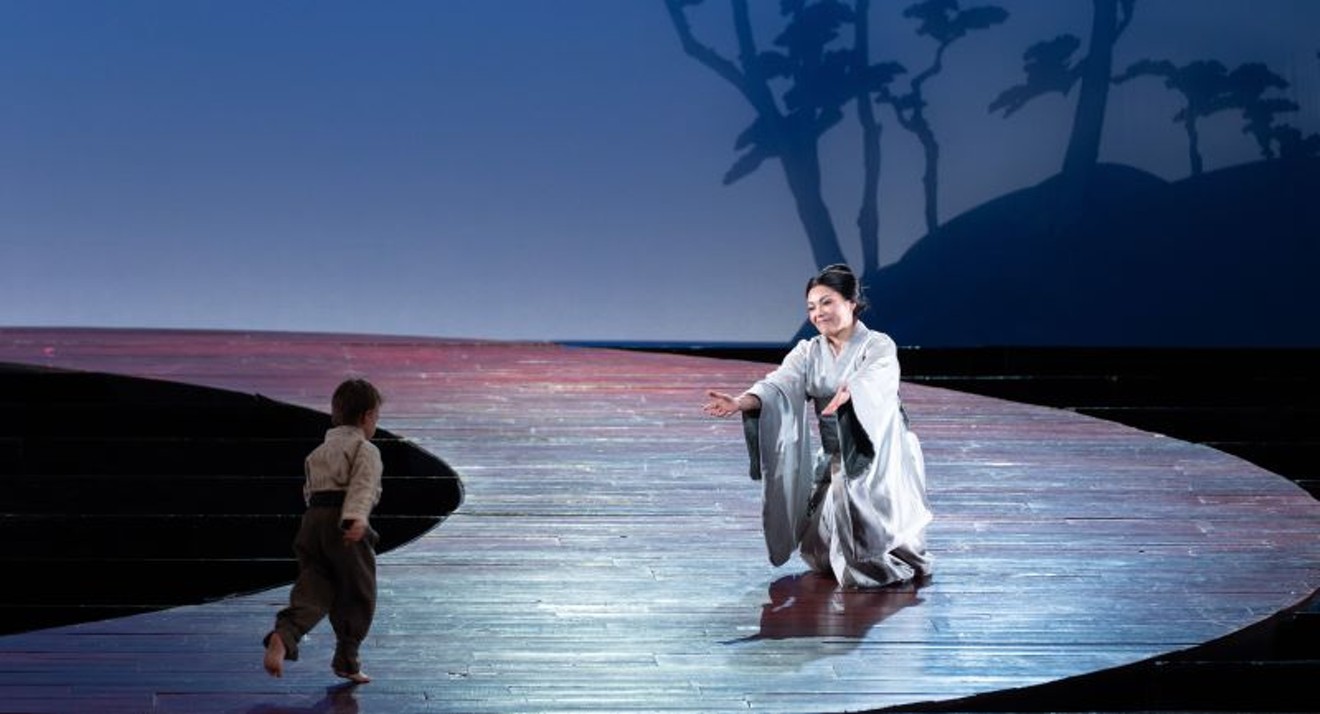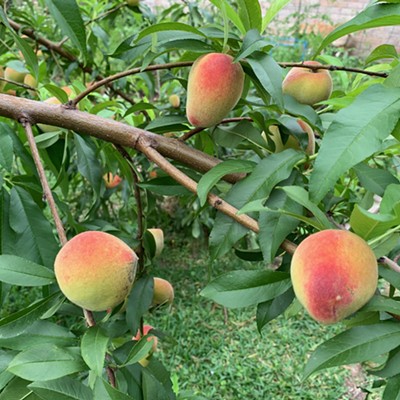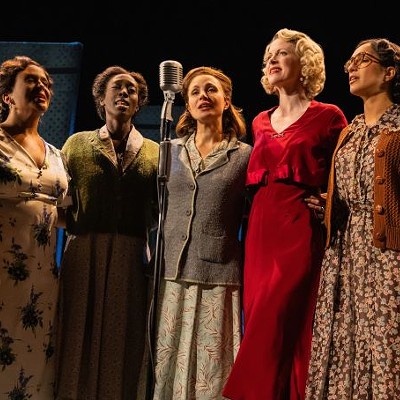Support Us
Houston's independent source of
local news and culture
account
- Welcome,
Insider - Login
- My Account
- My Newsletters
- Contribute
- Contact Us
- Sign out
Houston Grand Opera Does a Fine Job Presenting the Classic Madame Butterfly
D. L. Groover January 27, 2024 8:35AM

Madame Butterfly (Ailyn Peréz) welcomes her son.
Photo by Michael Bishop
[
{
"name": "Related Stories / Support Us Combo",
"component": "11591218",
"insertPoint": "4",
"requiredCountToDisplay": "4"
},{
"name": "Air - Billboard - Inline Content",
"component": "11591214",
"insertPoint": "2/3",
"requiredCountToDisplay": "7"
},{
"name": "R1 - Beta - Mobile Only",
"component": "12287027",
"insertPoint": "8",
"requiredCountToDisplay": "8"
},{
"name": "Air - MediumRectangle - Inline Content - Mobile Display Size 2",
"component": "11591215",
"insertPoint": "12",
"requiredCountToDisplay": "12"
},{
"name": "Air - MediumRectangle - Inline Content - Mobile Display Size 2",
"component": "11591215",
"insertPoint": "4th",
"startingPoint": "16",
"requiredCountToDisplay": "12"
}
]
Is there any more tuneful “star turn” in opera than Cio-Cio-San's entrance in Giacomo Puccini's Madame Butterfly?
Besotted with American naval officer Pinkerton, on shore leave in Nagasaki, the young geisha has been sold by marriage broker Goro for $100. Accompanied by friends and relatives, she walks up the hill to Pinkerton's newly purchased house overlooking the harbor to be wed. At 15 years old, she's innocence personified, wafting on Puccini's ethereal melody, augmented by a chorus of women with their lacquered paper parasols. It is the most mesmerizing entrance, equally stunning visually; a lovely respite after Pinkerton's confession to the American consul Sharpless that he's only marrying this fragile creature to get her into bed. He finds her intoxicating, but he doesn't mean it, eventually he wants an American wife. She'll soon forget him when he leaves after the honeymoon, he says coolly.
And so begins Puccini's great tragedy, abetted by crafty librettists Luigi Illica and Giuseppe Giacosa. The opera's inevitable trajectory leads downward, but accompanied by tsunamis of ecstatic music.
Although Puccini's opera had one of the most disastrous premieres in history (Milan's La Scala, 1904), closing after opening night on the composer's insistence, he feverishly revised the work at least five times until the 1907 revival at New York's Metropolitan Opera, conducted by legendary Toscanini and sung by fabled Geraldine Farrar and Enrico Caruso. The opera has never been out of the rep since, becoming one of the most beloved and performed operas of all time.
It's easy to see why. The tale is ineffably sad and yet incredibly beautiful to hear. A young girl will do anything for a love she believes in. She gives up her religion, her ancestral traditions; she's denounced by friends and family and eventually sinks into poverty, but will not give up her undying hope that Pinkerton will eventually return. He told her so, and why shouldn't she believe him since he has left her with a child. For three years she scans the harbor every day, fervently searching for his ship.
When she is given the opportunity to get out of her predicament by a proposal from wealthy prince Yamadori, she rebuffs him. I'm already married, she tells him dismissively, I'm an American wife, and my husband will return. Return he does – with his legal American wife.
Pinkerton may be a cad of the lowest order, but Puccini overlays his character with marvelous uplifting music. If he's kidding poor Butterfly during their love duet before their evening consummation, you'd never know it. Their music is sweepingly rhapsodic, a long passage of Puccini at his most ardent, which is ardent indeed. It makes you swoon along with the lovers.
The entire opera is like this – whole swathes of achingly gorgeous melody, the type that only Puccini could pen. The “Humming Chorus,” where Cio-Cio-San and her maid Suzuki wait overnight for Pinkerton's return is practically angelic; as is Butterfly's iconic, world-famous aria “Un bel di” (One beautiful day); or Pinkerton's guilt-filled final aria “Addio, fiorito asil” (Goodbye, flowery refuge); or Butterfly and Suzuki's ravishing “Flower Duet,” as they strew blossoms over the path to the house to welcome Pinkerton. Butterfly may take place in Japan, but its true heart lies in Italy, post-Verdi, with its broad romanticism and remaining hints of verismo. If you want Valentine's Day music, there is no one better to set the mood than Puccini, and Butterfly is Puccini in boldface.
American soprano Ailyn Peréz makes a lovely Cio-Cio-San. She has a rich creamy voice that caresses Puccini's difficult tessitura and can ring out those high notes with ease. She's an accomplished actor and conveys her character's journey from innocence to maturity with agility, but while delving deeply into her character, she tends to go soft, as if talking conversationally, which isn't what you usually hear in an Italian opera. She makes us lean in. When Puccini is sawing away in the orchestra, lighting a fire around her, it would be good to hear her.
Chinese tenor Yongzhao Yu, a Houston Grand Opera Butler Studio alumnus, hits all his high notes, too, but he sounds slightly pinched and contained. There's a full-bloodedness that's missing right now – that round, deep, vat-of-vintage-Chianti Italianate sound that resonates throughout Puccini (and Verdi and Bellini and Rossini, et al.). You can hear he has it in him; age will ripen him.
American mezzo Sun-Ly Pierce, another Butler Studio alumnus, is a joy as loyal maid Suzuki. When she joins voices with Pérez in the “Flower Duet,” just sit back and smile. Heaven on earth. American bass-baritone Michael Sumuel, as hapless Sharpless who warns Pinkerton about toying with Butterfly and then stands helpless as his warnings come to fruition, is conveyed through his chasm-deep voice whose resonance is nonetheless powerless to stop the tide.
The subsidiary characters are nicely limned by Philippine tenor Rodell Rosel as toadying marriage broker Goro; Chinese bass William Guanbo Su as curse-throwing Bonze; and American bass-baritone André Courville as Butterfly's pleading rich suitor Prince Yamadori.
A tripartite production between HGO, Grand Théâtre de Genèvre, and Lyric Opera of Chicago, this Michael Grandage-directed revival is from the 2014-15 season. It is very attractive, thank you to set and costume designer Christopher Oram and lighting designer Neil Austin. There are movable shoji screens, of course, misty background pine trees and a full moon, lanterns for the love scene, and a curved walkway that revolves during the “Humming Chorus,” so that Butterfly, Suzuki, and child Sorrow (Xavier Zug Detrick – does he need a stage name?) eventually face us directly during their nighttime vigil, all while Puccini's impressionism transports us into the empyrean. Absolutely sublime.
Maestro Patrick Summers masterfully conveys all the passion one could wish for in this most passionate of Puccini scores. Adapted from the 1900 David Belasco play which, in turn, had been adapted from the 1898 magazine short story by John Luther Long, which had been adapted from Long's missionary sister's letters from Nagasaki, and the whole thing freely appropriated from French novelist Pierre Loti's 1887 Madame Chrysanthème, Puccini's Madame Butterfly is the one to survive the ages. Her wings have spread throughout the world. Her musical migrations are evergreen, and, without doubt, eternal.
Performances are scheduled through February 11 at 7:30 p.m. Fridays, Saturdays, and Wednesday; and 2 p.m. Sundays at the Wortham Center, 501 Texas. Sung in Italian with English subtitles. For more information, call 713-228-6737 or visit houstongrandopera.org. $25-$280.
KEEP THE HOUSTON PRESS FREE...
Since we started the Houston Press, it has been defined as the free, independent voice of Houston, and we'd like to keep it that way. With local media under siege, it's more important than ever for us to rally support behind funding our local journalism. You can help by participating in our "I Support" program, allowing us to keep offering readers access to our incisive coverage of local news, food and culture with no paywalls.
D.L. Groover has contributed to countless reputable publications including the Houston Press since 2003. His theater criticism has earned him a national award from the Association of Alternative Newsmedia (AAN) as well as three statewide Lone Star Press Awards for the same. He's co-author of the irreverent appreciation, Skeletons from the Opera Closet (St. Martin's Press), now in its fourth printing.
Contact:
D. L. Groover
Trending Arts & Culture
- Reviews For The Easily Distracted:
The Fall Guy - The 10 Best And Most Controversial Hustler Magazine Covers Ever (NSFW)
- Top 5 Sickest Stephen King Sex Scenes (NSFW)
-
Sponsored Content From: [%sponsoredBy%]
[%title%]

Don't Miss Out
SIGN UP for the latest
arts & culture
news, free stuff and more!
Become a member to support the independent voice of Houston
and help keep the future of the Houston Press FREE
Use of this website constitutes acceptance of our
terms of use,
our cookies policy, and our
privacy policy
The Houston Press may earn a portion of sales from products & services purchased through links on our site from our
affiliate partners.
©2024
Houston Press, LP. All rights reserved.





